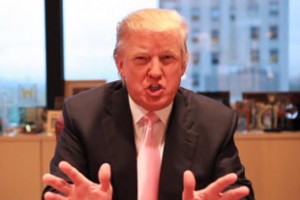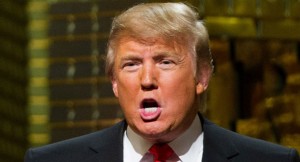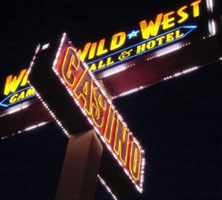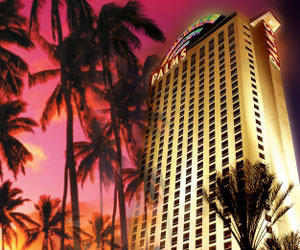To give the devil his due, if you visit Trump Taj Mahal and are dismayed because “carpets are frayed and dust-coated chandeliers dangle above the few customers there to  play the penny slot machines,” you are not entirely witnessing the handiwork of Donald Trump. After all, while he remained on a fat retainer as a pitchman for Trump Entertainment Resorts, he also beefed loudly about the spare-every-expense mentality of lead owner Marc Lasry and his bungling, hand-picked CEO, Bob Griffin, dredged up from the ranks of MTR Gaming, another company that is gone with the wind. (To be fair, Trump was making money from canny side deals with Lasry, including a $390,000 helicopter lease and the $197,000 layout for a year’s worth of Trump Ice Water. “The flavor of bombast,” perhaps?)
play the penny slot machines,” you are not entirely witnessing the handiwork of Donald Trump. After all, while he remained on a fat retainer as a pitchman for Trump Entertainment Resorts, he also beefed loudly about the spare-every-expense mentality of lead owner Marc Lasry and his bungling, hand-picked CEO, Bob Griffin, dredged up from the ranks of MTR Gaming, another company that is gone with the wind. (To be fair, Trump was making money from canny side deals with Lasry, including a $390,000 helicopter lease and the $197,000 layout for a year’s worth of Trump Ice Water. “The flavor of bombast,” perhaps?)
However, Trump’s characteristically hyperbolic claims to have been a successful Atlantic City gaming tycoon are coming under belated scrutiny. The New York Times took a hard look and concluded “that Mr. Trump’s casino business was a protracted failure … in reality he was failing in Atlantic City long before Atlantic City itself was failing.” True, Trump personally got richer, in part by sloughing off his personal financial obligations onto his casinos, leaving his investors holding the bag to the tune of $1.5 million. Part of the casinos’ undoing was Trump’s decision –in contravention of what he told New Jersey casino regulators — to build his casinos on a sinkhole of high-interest debt. This formula for failure was compounded by Trump’s four casino bankruptcies. Even in post-2006 Atlantic City, it’s difficult to fail on that level.
In one instance, Trump even may have broken securities laws (and committed at least one fraudulent conveyance) in the service of enriching himself. He also outwitted his  competitors with creative deal-making. For instance, he sweet-talked Harrah’s Entertainment into underwriting construction of Trump Plaza for $220 million plus giving him a $24 million fee for doing the job. He famously outwitted Merv Griffin for control of Trump Taj Mahal, at the time the world’s largest casino. But Trump outsmarted himself, too, racking up so much debt on the Taj that it stood no chance of even making its interest payments — and pulling business from other Trump casinos in town. It was during this time that Fred Trump laundered bailout money to his son by purchasing $3 million-plus in Trump’s Castle casino chips. (Trump’s Castle would become Trump Marina and then — sold for pocket change — the Golden Nugget, property of Tilman Fertitta, a fellow maverick who has succeeded where Trump failed.)
competitors with creative deal-making. For instance, he sweet-talked Harrah’s Entertainment into underwriting construction of Trump Plaza for $220 million plus giving him a $24 million fee for doing the job. He famously outwitted Merv Griffin for control of Trump Taj Mahal, at the time the world’s largest casino. But Trump outsmarted himself, too, racking up so much debt on the Taj that it stood no chance of even making its interest payments — and pulling business from other Trump casinos in town. It was during this time that Fred Trump laundered bailout money to his son by purchasing $3 million-plus in Trump’s Castle casino chips. (Trump’s Castle would become Trump Marina and then — sold for pocket change — the Golden Nugget, property of Tilman Fertitta, a fellow maverick who has succeeded where Trump failed.)
Opinions differ on this rocky period of Trump’s dominance of Atlantic City. “He helped expand Atlantic City, but he just did not put the equity into the projects he should have to keep them solvent,” says former Resorts International executive Steven Norton. But restructuring expert Scott Butera, who made his reputation by shoring up Trump’s failures says, “With his oversight, his brand and marketing, he’s really adept.”
He was, with the help of the likes of Butera and others, particularly adept at stiffing creditors. One company pushed to the brink by a Trump bankruptcy was Triad Building  Specialties. Triad’s Beth Rosser told the Times, “He had no regard for thousands of men and women who worked on those projects. He says he’ll make America great again, but his past shows the complete opposite of that.” When he went public with Trump Hotels & Casino Resorts, much of his new, publicly derived liquidity went into retiring Trump’s personal debts, not bolstering his Atlantic City front. In 1996, Trump received a $5 million bonus even while THCR was losing $66 million. Some company money went from one Trump pocket to another, with TCHR renting office space in — you guessed it — Trump Tower.
Specialties. Triad’s Beth Rosser told the Times, “He had no regard for thousands of men and women who worked on those projects. He says he’ll make America great again, but his past shows the complete opposite of that.” When he went public with Trump Hotels & Casino Resorts, much of his new, publicly derived liquidity went into retiring Trump’s personal debts, not bolstering his Atlantic City front. In 1996, Trump received a $5 million bonus even while THCR was losing $66 million. Some company money went from one Trump pocket to another, with TCHR renting office space in — you guessed it — Trump Tower.
During an ensuing five-year period, while casino revenues in Atlantic City boomed 18%, THCR’s were stagnant. “Had Mr. Trump’s revenues grown at the rate of other Atlantic City casinos, his company could have made its interest payments and possibly registered a profit. But with sagging revenues and high costs, his casinos had too little money for renovations and improvements, which are vital for hotels to attract guests,” reports the Times. The paradigm-changing debut of Borgata in 2003 set THCR permanently on a path to oblivion.
“The Trump name does not connote high-quality amenities and first-class service in the casino industry,” wrote lawyers for bank Donaldson, Lufkin & Jenrette. Meanwhile,  bondholders were smarting from a $500 million loss in Bankrupcty No. 3. They would take another $1.3 billion haircut in 2009, an ordeal that featured some spectacularly addled court testimony from Trump himself. The fifth and final bankruptcy of the Trump casinos occurred after he and Ivanka Trump had been reduced to minority investors, but it ended the Trump era on the Boardwalk with a whimper in lieu of a bang.
bondholders were smarting from a $500 million loss in Bankrupcty No. 3. They would take another $1.3 billion haircut in 2009, an ordeal that featured some spectacularly addled court testimony from Trump himself. The fifth and final bankruptcy of the Trump casinos occurred after he and Ivanka Trump had been reduced to minority investors, but it ended the Trump era on the Boardwalk with a whimper in lieu of a bang.
“I knew when to get out [of Atlantic City]. My timing was great. And I got a lot of credit for it.” But how many people think Atlantic City was worse off without Trump? About Trump’s casinos, The Donald is 100% right on one thing: “In 2009 they were worth a hell of a lot more than they are now.”
* Last week, JP Morgan gaming analyst Joseph Greff sat down with Station Casinos executives and got a glimpse into the company’s near future. Top-priority markets included Reno, where Station owns two plots of land, and southwest Las Vegas, where Durango Station has been on hold for well over a decade. Station is particularly bullish on this project, saying it has received offers for the land in excess of a million dollars an acre. The demographics and potential consumer spending in the area were favorably noted.
One Station property that may not be long for this world is Days Inn at Wild Wild West (which looks like it would topple over with a firm shove). During the height of the  casino bubble 10 years ago, Station’s owners proposed an $11 billion metaresort, Viva, for the site, despite its being out of the Strip corridor. (MGM Resorts International would struggle with $8.5 billion CityCenter even though it was right on the Strip.) That project went the way of the dodo bird.
casino bubble 10 years ago, Station’s owners proposed an $11 billion metaresort, Viva, for the site, despite its being out of the Strip corridor. (MGM Resorts International would struggle with $8.5 billion CityCenter even though it was right on the Strip.) That project went the way of the dodo bird.
However, Station has not given up on turning the Wild Wild West lemon into lemonade. In conversations with Greff, Station “management envisions partnering with a developer to build a high-rise residential or retail project, allowing [Red Rock Resorts] to retain the gaming rights.” So it’s not the second coming of Viva, but it’s impressive nevertheless, particularly given the dearth of quality casino product on Tropicana Avenue between the Strip and Boyd Gaming‘s The Orleans … a fairly long haul. Such a project would also give Station a competitive near-Strip position comparable to the one it will hold at the Palms, where it will go toe-to-toe with The Rio and Boyd’s Gold Coast.
Greff added that Station’s “outlook for the LV Locals consumer remains upbeat, with  encouraging trends in population, job, and wage growth in the Las Vegas” area. “As the Las Vegas Strip continues to perform well with increased visitation and strong convention/group business, RRR should benefit as it estimates 30-40% of its customers work on the Strip.” Greff also noted that will the construction business – a major source of Station customers – while only 75% as large as 10 years ago, is more diversified (read: stable) rather than being concentrated in the housing and resort industries.
encouraging trends in population, job, and wage growth in the Las Vegas” area. “As the Las Vegas Strip continues to perform well with increased visitation and strong convention/group business, RRR should benefit as it estimates 30-40% of its customers work on the Strip.” Greff also noted that will the construction business – a major source of Station customers – while only 75% as large as 10 years ago, is more diversified (read: stable) rather than being concentrated in the housing and resort industries.
Station also announced a pact with International Game Technologies to invest heavily in server-based slots. The project, which will be accomplished over the next year, should help Station keep pace with the competition, having been cash-strapped when the industry starting going server-based in the late 2000s. In all, some 19,000 slots will be affected by the switchover.
* How much is it worth to watch tonight’s Riviera implosion from the front seat of a helicopter? According to Sundance Helicopters, which held an eBay auction, it’s $2,651. Somebody was willing to pay serious dough to see the Monaco Tower bite the dust. Fortunately, the money is going toward a good cause.


[…] purchased Palms I speculated that expanding their Wild Wild West property might be a good idea. The Stiffs and Georges leads me to believe that Red Rock Resorts might agree. The blog says “Station has not given up on […]